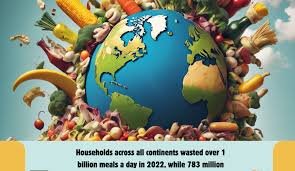The Global Food Waste Crisis: Solutions and Innovations for 2024
1. Introduction to the Food Waste Crisis
Food waste is a significant global issue, with billions of tons of food wasted each year while millions of people suffer from hunger. In 2024, addressing food waste has become a priority for governments, businesses, and consumers alike. Innovations and solutions are emerging to tackle this crisis, aiming to reduce waste at various stages of the food supply chain. This article explores the current state of the global food waste crisis and highlights some of the most promising solutions and innovations for 2024.
2. Innovations in Food Waste Reduction
- Food Waste Apps: Technology is playing a crucial role in combating food waste through innovative apps that connect consumers, businesses, and food banks. Too Good To Go and OLIO are leading apps that help users find surplus food from restaurants, grocery stores, and local businesses. These apps facilitate the redistribution of excess food to people who need it, reducing the amount of food that ends up in landfills. By offering discounts on surplus food and connecting food donors with those in need, these apps help decrease food waste and support communities.
- Food Waste Tracking Technology: Businesses are increasingly adopting technology to track and manage food waste. Winnow Solutions and LeanPath offer smart waste tracking systems that use sensors and data analytics to monitor food waste in commercial kitchens. By identifying waste patterns and providing actionable insights, these systems help restaurants and food service providers reduce waste, improve efficiency, and save costs. Tracking technology also helps businesses set targets and measure progress towards waste reduction goals.
- Upcycled Food Products: Upcycling, or repurposing food that would otherwise be wasted, is gaining traction as a sustainable solution. ReGrained and Rescue Brands are examples of companies creating upcycled food products from ingredients that would otherwise be discarded. For instance, ReGrained uses spent grain from breweries to produce nutritious snack bars. Upcycling not only reduces food waste but also provides new, valuable products for consumers.
3. Strategies for Reducing Food Waste
- Improved Supply Chain Management: Efficient supply chain management is crucial for minimizing food waste. IBM and Ripe.io are developing blockchain-based solutions to enhance transparency and traceability in the food supply chain. These technologies help track food from farm to table, ensuring that it is handled and distributed efficiently. By improving supply chain practices, businesses can reduce spoilage, optimize inventory, and ensure that food reaches consumers in a timely manner.
- Food Redistribution Programs: Food redistribution programs play a vital role in addressing food waste by redirecting surplus food to those in need. Organizations like Feeding America and Food Rescue US coordinate the collection and distribution of excess food from retailers, restaurants, and farms to food banks and shelters. These programs help bridge the gap between food surplus and food insecurity, ensuring that surplus food is used to benefit communities.
- Consumer Education and Behavior Change: Educating consumers about food waste and promoting behavior change are essential for reducing waste at the household level. Campaigns like Love Food Hate Waste and The Real Junk Food Project focus on raising awareness about the impact of food waste and providing practical tips for reducing waste. By encouraging consumers to plan meals, store food properly, and use leftovers creatively, these initiatives help reduce household food waste.
4. Future Outlook and Challenges
Addressing the global food waste crisis requires ongoing efforts and collaboration across various sectors. Key challenges include:
- Scaling Innovations: Scaling up successful food waste reduction innovations to reach a broader audience remains a challenge. While technology and programs show promise, widespread adoption is necessary to make a significant impact on global food waste.
- Policy and Regulation: Governments play a crucial role in supporting food waste reduction efforts through policies and regulations. Policies that incentivize food recovery, provide tax benefits for food donations, and set waste reduction targets can drive progress. Advocating for stronger policies and regulatory support is essential for advancing food waste solutions.
- Global Coordination: The food waste crisis is a global issue that requires coordinated efforts across countries and regions. International collaboration and knowledge-sharing are vital for developing effective solutions and addressing food waste on a global scale.
In conclusion, the global food waste crisis is a pressing issue that demands innovative solutions and collaborative efforts. Through advancements in technology, strategic waste reduction initiatives, and consumer education, progress is being made in addressing this crisis. As we move forward, continued innovation and commitment to reducing food waste will be essential for creating a more sustainable and equitable food system.











